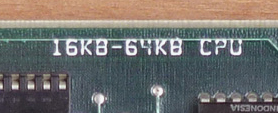| Parent |

| Bank 0: | 16 KB sized, | addressed 0000 to 3FFF hex | ( 0 KB to 16 KB) (soldered to motherboard) |
| Bank 1: | 16 KB sized, | addressed 4000 to 7FFF hex | (16 KB to 32 KB) (socketed) |
| Bank 2: | 16 KB sized, | addressed 8000 to BFFF hex | (32 KB to 48 KB) (socketed) |
| Bank 3: | 16 KB sized, | addressed C000 to FFFF hex | (48 KB to 64 KB) (socketed) |
| Value of 'aa' in 201 error | Corresponds to RAM bank | Address range of bank | Comment |
|---|---|---|---|
| 00 to 03 | Motherboard bank 0 | 00000 to 03FFF hex ( 0 KB to 16 KB) | You will never see this. See 'Failure of first 16 KB' section below |
| 04 to 07 | Motherboard bank 1 | 04000 to 07FFF hex (16 KB to 32 KB) | |
| 08 to 0B | Motherboard bank 2 | 08000 to 0BFFF hex (32 KB to 48 KB) | |
| 0C to 0F | Motherboard bank 3 | 0C000 to 0FFFF hex (48 KB to 64 KB) | |
| 10 to 9F | RAM on an expansion card/s | 10000 to 9FFFF hex (64 KB to 640 KB) | Cannot elaborate - too many different types of RAM cards |
| Value of 'bb' in 201 error |
Bit at fault | Comment |
|---|---|---|
| 00 | parity | |
| 01 | bit 0 | |
| 02 | bit 1 | |
| 04 | bit 2 | |
| 08 | bit 3 | |
| 10 | bit 4 | |
| 20 | bit 5 | |
| 40 | bit 6 | |
| 80 | bit 7 | |
| other | [multiple] | Multiple bits. Use the diagram here to calculate the failing bits, but also read the 'Multiple bit failure' section below. |